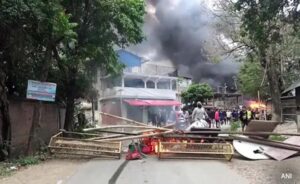The death penalty of Bhagat Singh, Rajguru and Sukhdev was materialized on March 23, 1931. There were a lot of efforts on the part of Mahatma Gandhi to cancel this death sentence. But, he was not successful. The hanging of Bhagat Singh and his compatriots instilled deep anguish in people’s minds. Some youths voiced their protests at the Congress Session, held in Karachi a few days after the hanging took place. Gandhiji said that his heart was bleeding profusely. In that session, Bhagat Singh’s father Sardar Kishan Singh came and said that his son had told him to complete the struggle for freedom under the Mahatmaji’s leadership.
Recently, the IT cell of a communal organization has been carrying on with its false propaganda about the role of Mahatma Gandhi regarding the hanging of the revolutionaries. These communal organizations had no ties with the freedom struggle. Their predecessors made no efforts to release Bhagat Singh and his compatriots. People should know about the lies that are being propagated by the successors of these forces who remained loyal to British imperialism. Now we can go through Netaji Subhas’s words regarding Gandhi’s efforts to withdraw the death sentence of Bhagat Singh and his compatriots.
According to the Gandhi Irwin pact signed on March 5, 1931, Subhas Chandra was released on March 8. Thereafter, he arrived in Bombay to meet Gandhiji. From there, they came to Delhi together. Subhas Chandra writes:
“Mahatma left for Delhi from Bombay and I was also there in the same train. Therefore, it was not merely an opportunity to conclude the discussion that we had in Bombay, but I also got an opportunity to notice the impact of this pact on the people. He had been felicitated everywhere, which showed that his popularity had reached at its peak. It had even superseded the history of 1921. As soon as we reached Delhi, we were taken aback when we got the news that government had made the decision to hang Sardar Bhagat Singh of Lahore Conspiracy Case and two of his companions. Mahatma was being pressurised to save the lives of these youths and it has to be admitted that Mahatma had tried his best… Lord Irwin told Mahatma that he had received a written application signed by a lot of people pleading milder punishment for those prisoners instead of death penalty. He had promised to look into the matter seriously by suspending the death penalty temporarily. This attitude of the Governor General prompted Mahatma Gandhi and others to conclude that the death penalty would finally be cancelled and the entire nation seemed to be delighted, especially Bengal, where some revolutionaries were to be hanged.
Ten days after the incident, a Congress Session was to be held at Karachi. Everyone expected that the death penalty would be withdrawn; therefore, on March 23, when we got the news on the way from Kolkata to Karachi that Bhagat Singh and his companions had been hanged, it was an extremely grievous and unexpected matter.” (‘Bharoter Muktisangram (Indian Struggle)’, Netaji Samagra Rachanabali, 2nd Part, p.119, Ananda Publishers )
Gandhi was against all forms of violence, even the violence sanctioned by the law, such as imprisonment and death penalty. Before the trial of Bhagat Singh and his compatriots, he sent a letter to Irwin (Viceroy) on May 4 1930, where he opposed the special tribunal being organized for the trial and compared it to the enforcement of “Marshal Law”. After their death sentence in the tribunal, Gandhiji said on January 31 1931 “Those who have been sentenced to death should not only be exempted from hanging, but they should also be released from prison. But, it is my personal opinion and I don’t want to impose it as a condition. (Collected works of Mahatma Gandhi – Vol XL, p.133).
On February 11, the special leave petition of Bhagat Singh and others had been cancelled in the Privy Council, and thereafter it could be understood that it was only the Viceroy who had the power to suspend the death sentence. On February 18, Gandhi met Lord Irwin and during the meeting, he opined, ‘If you want to make the present times and the present circumstances more favourable, you should suspend the death penalty of Bhagat Singh and his compatriots.’ Irwin could understand that it was not possible to withdraw the death sentence after the decision of the Privy Council but it could be suspended. He also told the same thing to Gandhiji. (National Archive, Home Pol File 33/1 and KW1931). Gandhiji hoped that if the death sentence could be suspended, he would try to cancel it at the proper moment.
Gandhiji met Irwin again on March 19 and told him to suspend the death sentence of Bhagat Singh and his compatriots. Irwin had documented this meeting in his report. Gandhiji met home secretary Herbert Emerson on March 20 and had a long discussion regarding the matter of the cancellation of death sentence.
Gandhiji made a last attempt and another step which he took was to send Congress leader Asaf Ali, the lawyer who was fighting the case on behalf of the revolutionaries for collecting a statement from them, where they would state that after being released, they would leave the path of violence. But, later, on March 27 Asaf Ali issued a statement in the “Bhobishyot” magazine and said that he could not meet Bhagat Singh, though he tried his best. 18 years later, when Asaf ali became the governor of Orissa, he told about this failed mission.
Meanwhile, according to the decision of the Congress Party, Irwin kept receiving messages from the entire nation regarding the withdrawal of the death sentence of Bhagat Singh and his compatriots. Lord Irwin was utterly confused. Gandhiji could understand this. That’s why he postponed his Karachi tour, stayed back in Delhi and intensified Irwin’s pressure. Robert Bernays, a journalist of London’s ‘New Chronicle’ writes in his diary— “On 21 March, today, Gandhi met Irwin and appealed for the withdrawal of death Sentence of the revolutionaries once again”. (The diary of Journalist Robert Bernays was published in 1932, which reveals a lot about the major events of that era, the details regarding the interviews of several leaders and statements of British officers of high rank. It is a very important source of information).
On March 22, the very next day, Gandhiji met Irwin again and requested to suspend the death sentence (CWMG – Vol. XLV, p.320, which is a detailed time table of Gandhi’s life from 1915 to 1948). Irwin promised Gandhi that he would obviously reflect on Gandhi’s appeal seriously (Aruna Asaf Ali, Selected writings and speeches, Patriot publication, pg.102).
Gandhiji saw a ray of hope. In the morning of March 23, he sent a personal letter to Irwin. He mentioned in this letter, that the death penalty is a heartless crime and then he mentioned about the possible response in people’s minds against it, the peace in the country, the possibility of judicial error and Irwin’s affection towards Christianity. But all the attempts went in vain. In the evening of March 23, the revolutionaries were hanged. When this news reached Gandhiji, he literally got emotional and grief stricken.
From the above mentioned incidents, it can be observed that the hanging of the revolutionaries in spite of lot of efforts to stop the death penalty, marks the success of European ICS and IP officers in creating pressure on Irwin rather than it marks the failure of Gandhiji. Finally, Irwin in a state of dilemma, submitted before the pressure created by Geoffrey de Montmorency, the governor of Punjab. Asaf Ali, the lawyer on behalf of the revolutionaries and the journalists of those days spoke and wrote about that threat of resignation. The telegram of Free Press too writes: Free Press has come to know from reliable sources that almost all the English Officers of the Punjab Government have threatened Lord Irwin that if he commute the death sentence they will resign en massó. (Bhobishyo, April 9, 1931)
These European officers prevented Asaf Ali from meeting Bhagat Singh after assuming that the suspension of the death sentence would proceed towards its cancellation,. Not only that, the implementation of the Punjab Governor’s demand for the hanging of the revolutionaries was also a master stroke of the European Court.
V.N Dutta, eminent historian, after reading Gandhi- Irwin letters and many contemporary files and news items, writes that Gandhiji tried to suspend and stop this death penalty wholeheartedly. This effort of Gandhi has to be seen in the light of the contemporary situation, the pressure of the mass opinion, Irwin’s role and the activities of British bureaucracy, the British administrative methods. (The headline of V N Dutta’s Key Note address at the international conference on ‘Bhagat Singh and his times” organized by Chandigarh’s ICHR and Institute of Punjab Studies on September, 2007 was “Bhagat Singh’s trial and execution: Gandhiji made a lot of efforts to stop this”.)
(Translation: Manjish Ray.)




